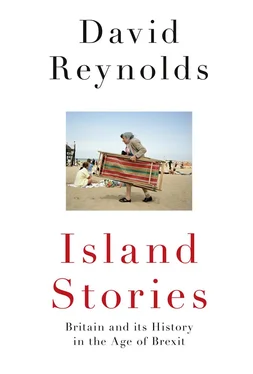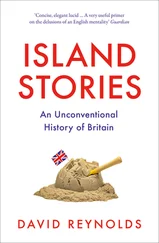The other response to sharper economic competition was to shift from free trade to protectionism. In the 1900s, Joseph Chamberlain may have failed in his campaign for tariff reform, but in 1932, at the nadir of the world depression after Britain had abandoned the gold standard, his son Neville – then Chancellor of the Exchequer – steered it through the Commons with Joe’s widow watching proudly from the gallery. In a trading economy now protected by tariffs, ‘Imperial Preference’, meaning preferentially lower rates, was accorded to countries of the British Empire. An embryonic Sterling area was also formed during the 1930s, and then consolidated during the Second World War. This overlapped with Imperial Preference but was not coterminous. Canada, though enjoying preferential tariffs, was outside the Sterling Area; countries in Latin America and Scandinavia belonged to the latter but not the former. Between 1913 and 1938 the empire’s share of British exports rose from 22 per cent to 47 per cent, and during the interwar years the empire attracted far more new British foreign investment than non-imperial countries – a contrast with the pre-1914 story. [44] Конец ознакомительного фрагмента. Текст предоставлен ООО «ЛитРес». Прочитайте эту книгу целиком, купив полную легальную версию на ЛитРес. Безопасно оплатить книгу можно банковской картой Visa, MasterCard, Maestro, со счета мобильного телефона, с платежного терминала, в салоне МТС или Связной, через PayPal, WebMoney, Яндекс.Деньги, QIWI Кошелек, бонусными картами или другим удобным Вам способом.
The empire/Commonwealth and the Sterling Area became the framework for British foreign economic policy – a privileged market for goods and capital which tried to insulate the domestic economy from international competition from the thirties to the late sixties.
The end of imperial preference and Britain’s entry into the EEC broadly coincided with the demise of the Sterling Area, the onset of the oil crisis and the collapse of the post-war boom. The long 1970s recession accelerated the process of deindustrialisation for all Western European countries, but Britain’s experience of it was exacerbated by the ferocity of class politics in the Thatcher era. Within this complex nexus of global economic change, it is no simple task to isolate the historical consequences of joining the EEC. Suffice to say here that a crude declinist narrative fails to take account of the country’s adaptive economic changes since the 1970s: an accelerating shift into services and the success of the financial sector, which adjusted particularly well to the post-imperial era.
‘As the good ship sterling sank, the City was able to scramble aboard a much more seaworthy vessel, the Eurodollar.’ [45] Конец ознакомительного фрагмента. Текст предоставлен ООО «ЛитРес». Прочитайте эту книгу целиком, купив полную легальную версию на ЛитРес. Безопасно оплатить книгу можно банковской картой Visa, MasterCard, Maestro, со счета мобильного телефона, с платежного терминала, в салоне МТС или Связной, через PayPal, WebMoney, Яндекс.Деньги, QIWI Кошелек, бонусными картами или другим удобным Вам способом.
This term signified dollar assets held not in the USA but in Europe – starting with those created by Middle Eastern states from the profits of the 1970s oil shocks. They were attracted to the City of London by the tax benefits on offer and by the deliberately more relaxed regulatory environment than Wall Street. But this was not the ‘old’ City, geared to sterling and the British economy, but a ‘new’ City, ‘externally orientated’ and ‘foreign-owned’ (dominated by US, Japanese and continental European banks) and which ‘flourished as long as it was left alone by the authorities’. [46] Конец ознакомительного фрагмента. Текст предоставлен ООО «ЛитРес». Прочитайте эту книгу целиком, купив полную легальную версию на ЛитРес. Безопасно оплатить книгу можно банковской картой Visa, MasterCard, Maestro, со счета мобильного телефона, с платежного терминала, в салоне МТС или Связной, через PayPal, WebMoney, Яндекс.Деньги, QIWI Кошелек, бонусными картами или другим удобным Вам способом.
This externalisation process accelerated when the Thatcher government ended exchange controls in 1979 and encouraged the ‘Big Bang’ deregulation of the stock market. In 1981 only 3.6 per cent of the UK stock market was owned by foreigners but the proportion then rose to 43.1 per cent in 2010 and 53.9 per cent in 2016. There are, of course, still plenty of British players in this business – Jacob Rees-Mogg, for instance, made his multimillion fortune as a hedge-fund manager – but in large measure the City had adapted to change by becoming an immensely lucrative offshore banking sector through which foreigners, not least post-Soviet Russian oligarchs, could move their money without too many questions or impediments. [47] Конец ознакомительного фрагмента. Текст предоставлен ООО «ЛитРес». Прочитайте эту книгу целиком, купив полную легальную версию на ЛитРес. Безопасно оплатить книгу можно банковской картой Visa, MasterCard, Maestro, со счета мобильного телефона, с платежного терминала, в салоне МТС или Связной, через PayPal, WebMoney, Яндекс.Деньги, QIWI Кошелек, бонусными картами или другим удобным Вам способом.
So the erosion of Britain’s relative advantage in manufacturing did not mean that the country became a minor feature of the world economy. On the contrary: today it is the tenth-largest global exporter and fifth-largest global importer; it ranks second or third in both inward and outward direct foreign investment. In economic terms Britain is roughly where one might expect for a country of its size, resources and historic commercial expertise. What has changed is that Britain’s relative power internationally has diminished because, over the last century, other states have generated economies that are equal or superior to it.
What mattered even more for the country’s place on the world stage was the changing nature of geopolitics. International rivalries intensified from the 1860s, after a half-century of peace since the defeat of Napoleon. And then revolutions in the technology of warfare over the subsequent century negated many of the benefits of Britain’s insular position.
Despite what is a common belief, ‘European peace in the nineteenth century did not derive to any great degree from Britain’s maintaining a continental balance.’ [48] Конец ознакомительного фрагмента. Текст предоставлен ООО «ЛитРес». Прочитайте эту книгу целиком, купив полную легальную версию на ЛитРес. Безопасно оплатить книгу можно банковской картой Visa, MasterCard, Maestro, со счета мобильного телефона, с платежного терминала, в салоне МТС или Связной, через PayPal, WebMoney, Яндекс.Деньги, QIWI Кошелек, бонусными картами или другим удобным Вам способом.
That equilibrium stemmed from the exhaustion of Europe in 1815, after more than two decades of ruinous war, and the acceptance of the post-Napoleonic peace by all the continental powers except defeated France. Rather than the Pax Britannica sustaining the peace it was peace that sustained the Pax . Indeed Britain was almost a free rider – allowed to concentrate its resources on global expansion because of the unusual tranquillity of Europe, which was in marked contrast to the eras of Philip II, Louis XIV and Napoleon.
Читать дальше












